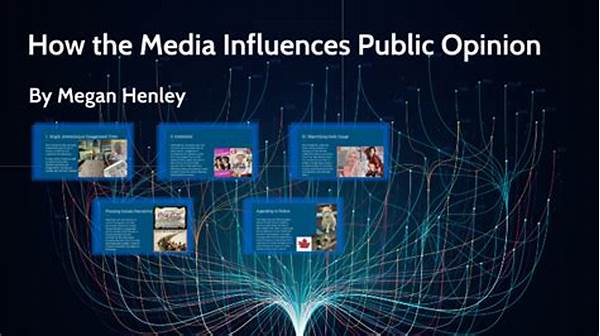The Influence of Media on Public Perception
The role of media in shaping public perception is a well-documented phenomenon that has been extensively studied and analyzed across various disciplines. Media, in its myriad forms, acts as a powerful conduit through which information flows, affecting the opinions, attitudes, and behaviors of the masses. Whether through news broadcasts, social media platforms, or print publications, media outlets possess the capability to influence public discourse and consequently shape public perception through media.
In today’s interconnected world, the velocity at which information is disseminated has increased exponentially, resulting in a more profound impact of media on societal norms and values. The framing of news stories, the selection of topics covered, and the portrayal of certain individuals or groups can lead to biased perceptions among the public. This emphasizes the criticality of responsible journalism and media literacy to mitigate potential prejudices and facilitate informed decision-making among the populace.
Moreover, shaping public perception through media also involves the strategic communication efforts of various stakeholders, including governments, corporations, and interest groups, who seek to sway public opinion to their advantage. These entities often employ sophisticated public relations campaigns to align media narratives with their objectives, thereby affecting public perception in a manner that supports their interests.
Mechanisms of Media Influence
There are several mechanisms through which media shapes public perception. Firstly, agenda-setting refers to the media’s ability to dictate which issues are deemed newsworthy and deserving of public attention. Secondly, framing involves the presentation of news within a certain context, thereby shaping the interpretation of facts. Thirdly, priming is the process by which media prepares the audience to process subsequent information. Fourthly, the repetition of specific messages can reinforce certain viewpoints, while fifthly, selective exposure enables individuals to choose media that align with their existing beliefs, further entrenching their perceptions.
The Role of Media Literacy
In the context of shaping public perception through media, media literacy emerges as an essential skill for individuals. Media literacy equips recipients with the analytical tools to critically evaluate media content, discern bias, and identify the underlying agendas of various media narratives. By fostering a skeptical and inquisitive mindset, media literacy enables audiences to navigate the complex media landscape, reducing susceptibility to misinformation and manipulation.
Furthermore, educational initiatives that focus on media literacy can empower individuals to become more discerning consumers of information. As a result, they can develop the capacity to engage in informed civic participation, thereby contributing to a more robust democratic society. By understanding the intricacies of shaping public perception through media, individuals are better positioned to recognize the multifaceted nature of media influence.
Ethical Considerations in Media Practices
Ethical considerations are paramount when discussing the concept of shaping public perception through media. It is incumbent upon media practitioners to adhere to ethical standards that emphasize accuracy, impartiality, and integrity in their reporting. The dissemination of false or misleading information can have far-reaching consequences, affecting not only individual reputations but also societal cohesion. Thus, the responsible exercise of media power necessitates a commitment to ethical journalism that prioritizes the public interest over sensationalism or commercial gain.
The advent of social media has further complicated the ethical landscape, as platforms with user-generated content challenge traditional editorial standards. These digital spaces enable the rapid spread of information, sometimes circumventing traditional journalistic gatekeeping. Therefore, it is imperative that media organizations and platforms work collaboratively to establish guidelines that ensure accountability while respecting freedom of expression.
The Global Context of Media Influence
In a globalized world, shaping public perception through media transcends national borders, with media narratives often influencing international relations and perceptions. The portrayal of geopolitical events, cultural practices, and national policies in global media can shape international public opinion and diplomatic relations. Consequently, media outlets wield significant power in framing global perceptions and must be cognizant of the cultural sensitivities and political contexts in which they operate.
Furthermore, the interplay between local and international media can lead to cross-cultural exchanges and the diffusion of ideas, which can either foster mutual understanding or exacerbate existing tensions. It is therefore essential for media practitioners to approach international reporting with a nuanced understanding of the diverse perspectives that coexist in the global media ecosystem.
The Future of Media Influence
As technology continues to evolve, so too will the methodologies for shaping public perception through media. The rise of artificial intelligence and algorithm-driven content delivery systems represents new frontiers in media influence, posing both opportunities and challenges. These advancements have the potential to enhance personalized media experiences but also raise concerns about echo chambers and the reinforcement of existing biases.
Moreover, as digital media consumption grows, traditional media outlets must adapt to remain relevant and authoritative sources of information. This necessitates a reinvention of media strategies that prioritize innovation while upholding journalistic integrity. By embracing new technologies responsibly, media entities can continue to shape public perception in a manner that contributes positively to society.
Conclusion
In conclusion, shaping public perception through media is a multifaceted endeavor that requires careful consideration of ethical responsibilities, media literacy, and global implications. The influence of media on public perception is undeniable, and as such, media organizations and practitioners must strive to balance the power they hold with a duty to inform and educate rather than manipulate. By fostering a media-literate populace and adhering to ethical standards, society can ensure that media remains a tool for enlightenment and progress, rather than division.





